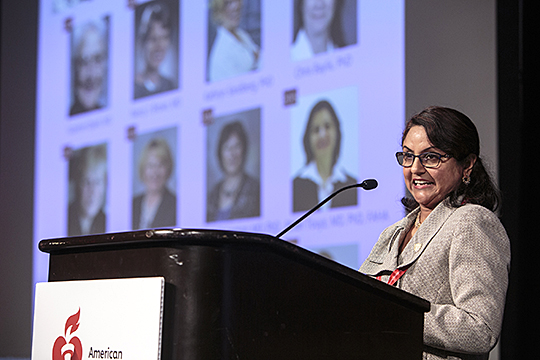The American Heart Association has recognized University of Toledo hypertension researcher Dr. Bina Joe for her innovative work focusing on the links between high blood pressure, genetics and gut bacteria.
Joe, Distinguished University Professor and chair of the Department of Physiology and Pharmacology in the College of Medicine and Life Sciences, has spent nearly two decades studying and isolating the role genetics play in individuals with high blood pressure.

Dr. Bina Joe spoke at the American Heart Association’s Hypertension 2019 Scientific Sessions in New Orleans. More than 600 people from 22 countries attended the event.
Most recently, Joe’s lab has been investigating how the colonies of tiny microorganisms that call our bodies home may help regulate our blood pressure. In 2018, Joe received a $2.64 million grant from the National Heart, Lung and Blood Institute to advance her groundbreaking research.
In recognition of her impactful work, the American Heart Association recently presented Joe with the Harriet Dustan Award, which recognizes female investigators who have made outstanding contributions in the field of hypertension.
“This is a really prestigious award, chosen from many of the top hypertension researchers in the world,” said Joe, who is also founding director of the UToledo Center for Hypertension and Precision Medicine, which is recognized by the University as a research area of unique distinction. “I feel very passionate about our research, and I’m honored to have been recognized by this award from the American Heart Association.”
The award is named in honor of Dr. Harriet Dustan, a trailblazer as both a female physician-scientist and as a hypertension researcher. Dustan was the first woman to sit on the Board of Governors of the American Board of Internal Medicine, and she was among the first researchers who linked hypertension to excess sodium consumption.
Dustan, who started her career at the Cleveland Clinic and later went on to the University of Alabama School of Medicine, died in 1999.
“Dr. Dustan was born and lived her life in the previous century when they did not have a genomic avenue to look at microbial genomes and their contributions to hypertension,” Joe said. “She was asking the same questions we are now. She once wrote in one of her papers that not everything is known. I hope to fill that knowledge gap with the new idea we have that salt regulates blood pressure via microbiota and liver metabolites. I’m proud to bring the award bearing her name back to Ohio, where she started her research career.”
The award was presented in New Orleans Sept. 7 during the American Heart Association’s Hypertension 2019 Scientific Sessions.
Joe also was the recipient of the association’s 2014 Lewis Dahl Memorial Lectureship. That award honors the groundbreaking work of Dahl, who developed a genetically based experimental model of hypertension. The lecture is given each year by a prominent hypertension researcher.